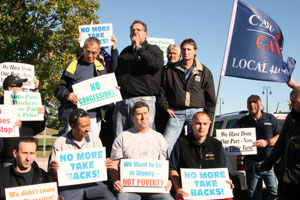Canadian Auto Parts Workers Say ‘Enough Is Enough!’

In a dramatic Auto Parts Worker Day of Action Wednesday, 15,000 members of the Canadian Auto Workers (CAW) staged noon-hour rallies outside more than 100 worksites across Ontario. The action came in response to increasing pressure from auto parts manufacturers for union givebacks.
At one of the larger actions, at Integram Seating in Windsor, 250 members rallied with signs saying “No More Take Backs!,” “Auto Parts Workers Have Paid the Price,” and “If CEOs get a raise, why can’t I?”
The union has already helped the auto industry with concessions in both the assembly and parts sectors, says Gerry Farnham, president of CAW Local 195 in Windsor, across the river from Detroit. “We’ve given on things like health and welfare, and time off the job. But we’re drawing the line. No two-tiering. No wage or pension cuts.”
Preparations for the October action began at the union’s Auto Parts Council in May, with 250 elected worksite leaders attending. “All the auto parts leaders were there. Assembly people, too,” said Farnham. “We passed a resolution that cutting labor costs is not the solution to challenges in the parts industry, that we will not accept wage concessions, that we will not put the next generation of workers on a second tier.”
The Canadian auto industry employs 100,000 workers, including 65,000 in the parts sector, mostly in Ontario. “We’re speaking with one voice today,” Farnham said on October 27, “and that’s unusual in the parts industry where each facility has its own contract, and plants are pitted against each other.”

SUPPORT LABOR NOTES
BECOME A MONTHLY DONOR
Give $10 a month or more and get our "Fight the Boss, Build the Union" T-shirt.
Auto parts companies are demanding givebacks even while the industry has begun turning around with stronger profits. Parts manufacturer Martinrea, for example, earned $21 million during the first half of 2010. Yet the Martinrea-Fabco stamping plant in Ridgetown, Ontario, with 200 members of CAW Local 127, is demanding members cut pay from around $21 per hour to $14. Local 127 will hold a strike vote meeting October 30.
The concessions being pushed in Canadian auto were ground-tested first in the U.S., with U.S. workers seeing more painful versions. The Big Three automakers, GM, Ford, and Chrysler, got the UAW to accept two-tier wage schemes starting in 2007, with new hires earning just half of regular wages, and today they are pushing to expand the portion of workers who receive lower pay, as seen at GM’s Lake Orion, Michigan, assembly plant and Indianapolis stamping plant.
In Canada, by contrast, CAW has largely resisted two-tiering in the assembly plants.
What is shared north and south of the border is the automaker pattern of moving more and more work to smaller parts makers, and then squeezing the parts makers to lower their prices—which, in turns, prompts the parts makers to squeeze their workers, and puts downward wage pressure on the assembly plants as well.
The October 27 action day is a powerful first step for CAW. As the union’s national president, Ken Lewenza, commented in The Record, a daily paper in Ontario: “It is likely that in the months ahead an auto parts employer will test our resolve. We don’t want confrontation, but we mean what we say. We will mobilize all our resources to resist employer demands—demonstrations, occupations, plant shut-downs, and refusing to handle disputed auto parts in our assembly facilities.”






You must log in or register to post a comment.